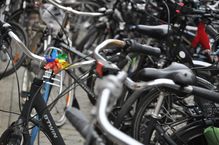Everyday mobility
Everyday mobility

The design of climate-friendly mobility for university staff plays a major role in the sustainable development of the university and affects it as an employer, place of study, research institution and social actor.
Greenhouse gas emissions
In 2024, the area of everyday mobility accounted for 28.74% of the university's total emissions, or 6,226 tonnes of CO2 equivalents. This makes the area of everyday mobility the second largest contributor to the university's total emissions. The figures for everyday mobility are based on a comprehensive mobility survey of students and employees.

Bicycle
Cycling is not only environmentally friendly, but also healthy and cost-effective. Various measures are being taken at the University of Oldenburg to further promote this sustainable mode of transport: These include an expansion of the cycling infrastructure on campus, repair services, as well as opportunities for bike hire and leasing.

Public Transport
The University of Oldenburg offers students and employees attractive public transport services with its semester public transport pass and job ticket, which promote sustainable mobility and make regional public transport convenient to use.

Car
In order to strengthen electromobility, the construction of charging infrastructure for electric vehicles is being planned on campus. At the same time, information on the vehicle fleet, such as kilometres driven and consumption, will be documented in order to promote sustainability and efficiency.

Consideration of parking space management measures
Following a decision by the Presidential Board, the possible introduction of a parking sapce management system for the University of Oldenburg is currently being considered. To this end, Climate Action Management has been commissioned to develop a technical and tariff-based implementation recommendation in coordination with Building Management (Division 4).

Mobility survey 2024
The mobility survey is conducted every two years at the University of Oldenburg. The aim of the mobility survey is to gain an overview of the current mobility behaviour of university members and to determine greenhouse gas emissions in the area of everyday mobility.
The mobility environment map of the University of Oldenburg provides a clear overview of the diverse, sustainable and environmentally friendly mobility options on campus and in the surrounding region. Different forms of mobility, such as bicycle, public transport, car and central contact points are marked with coloured markers: green for bicycle, blue for public transport, red for car and yellow for contact points. Individual categories can be clicked and selected in the drop-down menu. This allows you to find sharing offers, repair facilities or bus stops at a glance.
Measures from climate action concept
The following list of measures for the field of action of everyday mobility is an excerpt from the Integrated Climate Action Concept. A more detailed view of the respective sub-measures can also be viewed there.
Promotion of e-mobility
- Conversion of vehicle fleet to e-mobility
- Charging points for e-cars
Parking space management
Promotion of bicycle infrastructure
- Promotion of bicycle repair
- Bicycle rental for employees & students
- Load bikes in the university fleet for transport
- More covered, lockable parking spaces with charging facilities
- Charging infrastructure for e-bikes
- Commitment at municipal level to better cycle paths
- Cycling routes and plans with a focus on the university
- Enable (financial) support for bicycles, e-bikes, cargo bikes, etc.
- Rededication of parking space to bicycle parking spaces
Promotion of public transport
- Commitment to better public transport connections from rural areas
- Commitment to improved connections at the Wechloy railway station.
- Commitment to increased bus service at peak times during the university day
- Better communication of the Job Ticket
Action & Communication
Governance & Partnerships
- Permanent networking of actors
- Establishment of a mobility working group / mobility round table
- Development of a mobility concept for the WHV location
- Reduction of own vehicle fleet and strengthening of CarSharing

